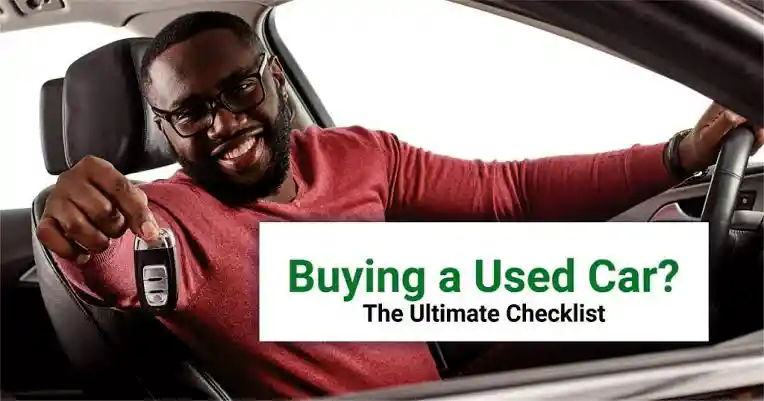Documents to collect when buying a used car (Tokunbo car) in Nigeria can be found here on TJ News Nigeria.
The Nigerian automobile market has witnessed steady growth in the purchase of Tokunbo cars (used cars imported into Nigeria). Due to high inflation, the rising costs of brand-new vehicles, and financial constraints, many Nigerians now prefer buying used vehicles to meet their transportation needs.
TJ News Nigeria reports that delays in new car production caused by global chip shortages and currency instability have further pushed buyers to opt for foreign used cars. However, while buying a Tokunbo car can be a wise investment, it comes with serious responsibilities—chief among them is ensuring proper documentation.
Failure to collect the required documents can result in legal troubles, seizure by authorities, or financial loss. This comprehensive guide outlines the essential documents you must collect when buying a Tokunbo car in Nigeria, how to buy Tokunbo car in Nigeria, used car buying checklist Nigeria, plus what each document represents and why it matters.
Why Proper Documentation is Important When Buying a Tokunbo Car
Many Nigerians focus solely on the cost of the vehicle, often ignoring the risks associated with improper documentation. Unfortunately, this is how some end up purchasing stolen vehicles or cars with unresolved customs issues.
It is crucial to understand that if you cannot verify ownership and authenticity through documents, you stand the risk of:
- Losing the vehicle to law enforcement
- Being prosecuted for possession of stolen property
- Spending extra money resolving avoidable disputes
Therefore, documentation verification is just as important as checking the engine, mileage, or tire quality of the vehicle.

Essential Documents to Collect When Buying a Tokunbo Car in Nigeria
1. Customs Clearance Documents
One of the first documents to request when buying a Tokunbo car in Nigeria is the customs clearance paper. This document proves that the vehicle was legally imported into Nigeria and that all required import duties have been fully paid to the Nigerian Customs Service (NCS).
What to Check:
- Original customs stamp and signatures
- Vehicle Identification Number (VIN) must match the one on the car
- Duty Certificate Number
- Name of clearing agency (if applicable)
Without this document, law enforcement officers, including Customs, Federal Road Safety Corps (FRSC), or Vehicle Inspection Officers (VIO), may seize the car on suspicion of smuggling.
2. Vehicle Registration Certificate
The Registration Certificate (RC) is a key document that proves that the vehicle is registered with the Nigerian authorities. It carries details like:
- Owner’s full name
- Registration number
- Engine and chassis numbers
- State of registration
- Date of first registration
Ensure that the chassis number on the certificate matches the one on the car. Any discrepancy could indicate fraud, tampering, or previous criminal use of the car.
3. Proof of Ownership Certificate
The Proof of Ownership Certificate confirms that the person selling the car is the legitimate owner. This document is different from the registration certificate and is equally essential.
Without this certificate:
- You may have difficulty transferring the car’s registration to your name
- You may risk losing the vehicle if a prior claim to ownership emerges
4. Insurance Certificate
A valid insurance certificate—at least a third-party insurance policy—should be part of the documents handed over by the seller.
Why You Need It:
- Verifies that the car is legally insured for operation on Nigerian roads
- Protects you from liabilities if an accident occurs after purchase
- May help in processing new or renewed insurance policies under your name
In some cases, buyers may continue with the existing insurance company or transfer the policy depending on the provider’s policies.
5. Roadworthiness Certificate
This certificate indicates that the car has passed mandatory mechanical and safety checks and is fit to drive on Nigerian roads.
Benefits:
- Essential when renewing registration or vehicle licenses
- Avoids VIO penalties for driving unfit vehicles
- Provides assurance of basic vehicle condition at the point of sale
6. Plate Number Allocation Document
While the car itself may come with license plates, the official plate number allocation document is a record showing that the assigned number belongs to the car.
It complements the Registration Certificate and can help in:
- Changing plate numbers (if needed)
- Preventing duplication or theft of number plates
- Avoiding complications with law enforcement
7. Purchase Receipt (With Seller’s Signature)
The purchase receipt is a basic yet critical document. It should:
- State the full name and address of the seller
- Clearly mention the VIN, make, model, and purchase price
- Contain the seller’s signature and date
This receipt is your primary proof of transaction, especially when filing for ownership transfer.
8. Affidavit of Sale or Transfer of Ownership
Some buyers prefer requesting a sworn affidavit of sale from the seller, especially for vehicles sourced from individuals instead of dealerships. This serves as an additional legal backing in case of future disputes.
Frequently Asked Questions (FAQs)
✅ Are Second-Hand Cars Worth Buying?
Yes, many Tokunbo cars are durable and cost-effective, provided they are purchased from trusted sources with complete documentation. A thorough mechanical inspection is advised before completing the purchase.
✅ What’s the Price Range for Tokunbo Cars in Nigeria?
- Basic models (Toyota Corolla, Honda Civic): ₦2 million – ₦5 million
- Luxury models (Mercedes-Benz, Lexus): ₦6 million – ₦20 million+
- Factors such as brand, mileage, and condition determine the final price.
✅ Where Can I Buy Tokunbo Cars in Nigeria?
Reliable platforms like Carmart.ng offer a wide selection of verified Tokunbo vehicles. Buyers can also visit reputable car dealerships in major cities like Lagos, Abuja, and Port Harcourt.
Here’s a bullet-point version of how to buy a Tokunbo car in Nigeria, optimized for readability and SEO:
How Buy a Tokunbo Car in Nigeria
Buying a Tokunbo car in Nigeria requires careful planning, due diligence, and verification to avoid costly mistakes
- Define Your Budget: Decide how much you’re willing to spend, factoring in the cost of insurance, registration, and possible repairs.
- Research Suitable Car Models: Choose a car that fits your lifestyle, fuel economy needs, and availability of spare parts in Nigeria.
- Find Reputable Sellers: Buy from verified car dealerships, licensed importers, or trusted online platforms with positive reviews.
- Inspect the Vehicle Thoroughly: Engage a professional mechanic to check the engine condition, mileage, chassis integrity, and signs of accidents or tampering.
- Verify Vehicle Documents: Request and confirm essential documents such as:
- Customs Clearance Papers
- Proof of Ownership
- Registration Certificate
- Insurance Certificate
- Match VIN/Chassis Number: Ensure the Vehicle Identification Number (VIN) matches across all documents and the vehicle itself.
- Negotiate and Collect Receipt: Agree on the final price, then collect a signed receipt detailing the vehicle’s information and purchase amount.
- Legal Ownership Transfer: Visit the appropriate licensing authority to transfer the registration and ownership into your name officially.
- Update Insurance: Either transfer the existing policy or obtain new insurance coverage before regular use.
- Final Test Drive: Conduct a final test drive before concluding the purchase to confirm satisfaction with the vehicle’s performance.
What to Consider Before Buying a Tokunbo Car
Beyond documentation, prospective buyers should:
- Conduct a mechanical inspection by a trusted auto technician
- Verify the VIN online to check for accident or theft history
- Test-drive the car to confirm comfort, handling, and mechanical soundness
- Research the market price to avoid scams
If possible, consider a full vehicle history report, especially for cars imported from the USA or Europe.
Related Resources for Car Buyers
- How to Lower Cholesterol Naturally: Nigerian Diet and Exercise Tips
- Foods That Help Detoxify the Liver: Nigerian Guide to Liver Cleansing
- Natural Ways to Improve Kidney Health Using Local Nigerian Foods
- How to Get a Police Tinted Glass Permit in Nigeria
While these articles focus on health, remember that car buying also impacts personal well-being—especially when financial mistakes can lead to stress or long-term debt.
Conclusion on documents to collect when buying a used car
Buying a Tokunbo car in Nigeria can be one of your best financial decisions—if you approach it the right way. TJ News Nigeria learnt that skipping important steps like collecting proper documentation has caused many Nigerians untold hardship, including vehicle seizures or costly legal disputes.
Before you make payment for any vehicle:
- Insist on all key documents listed in this guide
- Verify the authenticity of every certificate
- Consult legal or automotive experts if in doubt
With thorough documentation, clear proof of ownership, and a little patience, your Tokunbo car purchase can be smooth, secure, and rewarding.







